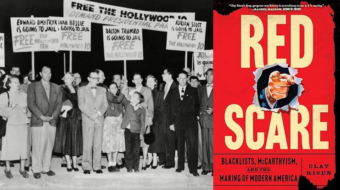Original source: “American history consists of one long battle between the forces of reaction and the defense of wealth and power, on the one hand, and the forces of progressivism and community, on the other.” That’s the premise of a new book The Progressive Revolution: How the Best in America Came to Be by Michael Lux.
A long-time political activist and consultant in Washington, Lux is now best known as a regular columnist for Huffington Post and a co-founder of the progressive blog, OpenLeft. But he’s also, by his own description, “a thoroughly devoted history buff” who has “devoured every American history book that I had time to read.”
In The Progressive Revolution, he draws on his reading and experience to offer both an overview of the nation’s past and predictions for the future.
Lux is clear from the start which side of the battle he’s on. His heroes include Tom Paine, whom he calls “one of the greatest political philosophers of all time,” Frederick Douglass, Susan B. Anthony, John L. Lewis, Walter Reuther, Martin Luther King Jr., Cesar Chavez and Rachel Carson. Movement leaders such as these “have always been ahead of the politicians and have pushed our country to become better,” he maintains.
On the other side of the battle, Lux lists the considerable failures of conservative administrations over two centuries and then reviews the Bush record—everything from grossly inadequate job creation to the decline in median family income, the high rates of personal bankruptcy and the large numbers of Americans without health insurance.
From all of this, Lux concludes:
When you look at our country’s economic history…conservative policies have been at the heart of our worst economic times and progressive policies have given us our best economic times.
What of the future? Although he completed his book before the November elections, he was correct in predicting that “the time is now ripe for one of those big change moments, but making this moment happen will demand courage and boldness.” He senses that “the progressive movement is finally beginning to emerge from its period of relative slumber.”
Lux is encouraged by the rise of new multi-issue organizations on the left, long-term strategic thinking among progressive donors and foundations, the union movement “showing some spunk and energy in organizing” and young people getting involved in politics.
But perhaps most important of all, in Lux’s view, is the way progressive have developed a vibrant movement via the Internet—”MoveOn.org, blogs and other Internet-based structures [that] have created tools that let people volunteer, give money, meet their neighbors at house parties and contact their elected officials.”
Of course, nothing is guaranteed. In the end, Lux’s vision of a new progressive revolution in America comes down to this:
We can solve the immense problems of our time if we understand our history, throw fear and caution aside, and then choose the path that goes forward.










